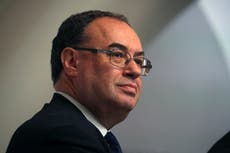Boris Johnson rejects Bank governor’s claim of ‘helplessness’ over cost of living crisis
Andrew Bailey’s ‘apocalyptic’ warnings has caused tension with government
Boris Johnson has said he does not share the economic pessimism expressed by Bank of England governor, who admitted to feeling “helpless” amid the worsening cost of living crisis.
Andrew Bailey warned on Monday of an “apocalyptic” spike in food prices, predicted unemployment will rise, and conceded that the Bank is largely “helpless” to address inflation.
Asked on Tuesday if too he felt “helpless” over living costs, the prime minister said: “No – I think that this country has got a fantastic future.”
Mr Johnson told reporters: “What we’ve got to do is fix some short-term global inflation issues caused by coming out of the pandemic – particularly on supply chains, particularly on the cost of energy. But we have the fixes.”
In a sign of the tension between the government and the governor, cabinet minister Brandon Lewis said he was “surprised” by the language Mr Bailey used to describe the cost of living crisis.
Mr Johnson’s official spokesperson declined to comment on Mr Bailey’s remarks, telling reporters: “It’s for him to justify the words he uses.”
However, senior government source made clear that the governor’s decision to use such strong language in a public hearing was not regarded as helpful in No 10.
“I think you need to be cautious about your language when you’re talking about that sort of stuff if you’re in the Bank of England,” said the source.
On the governor’s comments about employers’ being justified to continue with pay restraint, the source added: “I think he was trying to stick to a macro-economic point that he was trying to make, but obviously it’s the forum where you are making it. That’s not where I would do it.”
Asked about Mr Bailey’s “apocalyptic” warning on food prices, the Northern Ireland secretary Mr Lewis told the BBC: “I was surprised to see that particular turn of phrase, I have to say.”
Mr Lewis’ criticism follows a Sunday Telegraph article which quoted unnamed ministers attacking the Bank and suggesting its independence was being questioned within government.

However, chancellor Rishi Sunak has indicated his support for continued Bank of England independence, telling MPs “whilst we do face challenges at the moment, the record of 25 years of central bank independence speaks for itself”.
His comments came as the Tory chair of the Treasury Committee Mel Stride called on Mr Sunak to give a “categoric assurance to the House that there are no plans of any kind to restrain the independence” of the Bank.
The Office for National statistics recorded inflation at 7 per cent in March, but the Bank of England has said inflation is likely to peak at 10.25 per cent during the final quarter of 2022.
It comes as the chairman of Marks & Spencer warned that food prices could soar by as much as 10% this year. “It’s very negative for consumer discretionary income but it’s perhaps not apocalyptic,” he told BBC Radio 4’s Today programme.
Join our commenting forum
Join thought-provoking conversations, follow other Independent readers and see their replies
Comments



Bookmark popover
Removed from bookmarks